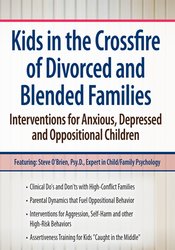

Children caught in the crossfire of divorce and those struggling with a new blended family frequently exhibit emotional and behavioural difficulties.
Children’s challenges may become exponential when divorce-related conflict is chronic and/or when parents’ new relationships lead to cohabitation or remarriage.
Kids end up stuck in the middle, taking on the role of fixer or therapist. Negative talk about each parent fuels blame games and regression while reunion fantasies persist.
Watch child-family psychologist, Dr. Steve O’Brien, who will provide you with a practical treatment approach for children struggling with anxiety, depression, and oppositional behaviour secondary to divorced and blended family stressors.
Treatment techniques will include:
Upon watching this recording, you will walk away with multiple clinical tools and leave feeling empowered to take on the challenges of helping children struggling with highly stressful family transitions.
| File type | File name | Number of pages | |
|---|---|---|---|
| Manual - Kids in the Crossfire of Divorced and Blended Families (20.7 MB) | 62 Pages | Available after Purchase | |
| Manual - Kids in the Crossfire of Divorced and Blended Families - French (20.7 MB) | 62 Pages | Available after Purchase | |
| Manual - Kids in the Crossfire of Divorced and Blended Families - Italian (20.7 MB) | 62 Pages | Available after Purchase | |
| Manual - Kids in the Crossfire of Divorced and Blended Families - German (20.7 MB) | 62 Pages | Available after Purchase | |
| Manual - Kids in the Crossfire of Divorced and Blended Families - Spanish (20.7 MB) | 62 Pages | Available after Purchase |

Steve O’Brien, PsyD, is a clinical psychologist with over 30 years of experience working with children, adolescents, young adults, and families in his Clearwater, Florida practice. He is a respected national consultant for mental health professionals seeking guidance on the treatment of anxiety and mood disorders, ADHD, Autism Spectrum Disorders, and adjustment challenges in divorced and blended families.
Since 2017, Dr. O’Brien has provided continuing education and professional training for mental health clinicians, focusing on evidence-based interventions for anxiety, depression, and neurodevelopmental disorders in youth. He is the author of The Essential Guide to Treating Childhood and Adolescent Anxiety, a clinical manual designed to enhance treatment outcomes.
His integrative-systems approach combines CBT, interpersonal techniques, and exposure/desensitization strategies, all tailored to the developmental needs of young clients and their families. Intensive parent consultation—emphasizing psychoeducation, communication skills, and behavior modification—is a cornerstone of his therapeutic work.
Dr. O’Brien has worked in numerous healthcare environments, including community mental health, psychiatric, inpatient/residential, substance abuse, and medical facilities. He also served as associate professor of child-adolescent studies at the Florida School of Professional Psychology. In addition to his clinical work, Dr. O’Brien is an app developer (Life@Home by Psychtouch.com) and a frequent guest on local news outlets for his expertise on childhood anxiety. Visit obrienpsychology.com for more information.
Speaker Disclosures:
Financial: Dr. Steven O'Brien maintains a private practice. He receives a speaking honorarium, recording and book royalties from Psychotherapy Networker and PESI, Inc. He has no relevant financial relationships with ineligible organizations.
Non-financial: Dr. Steven O’Brien is a member of the American Psychological Association and the Florida Psychological Association.
CHALLENGES FOR CHILDREN FACING DIVORCE & FAMILY TRANSITION
Multiple Losses, Multiple Reactions
TREATMENT TECHNIQUES FOR KIDS IN THE CROSSFIRE
Intervention Strategies for Anxious Children
Please wait ...